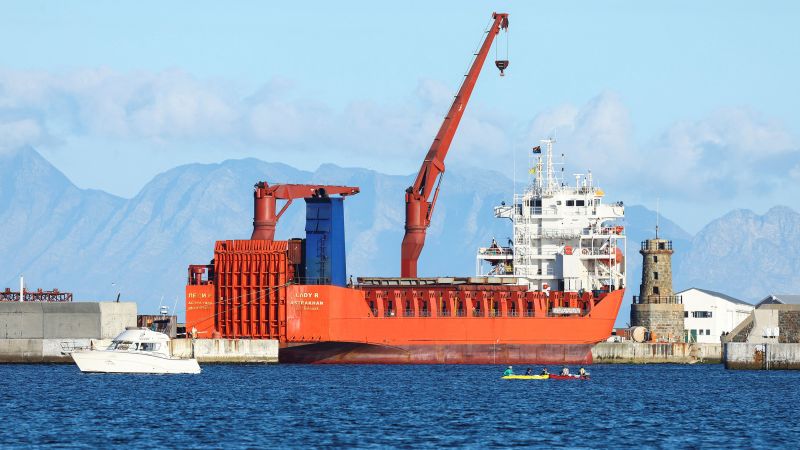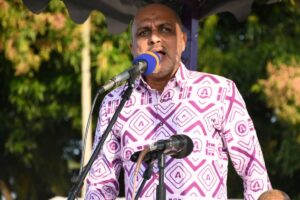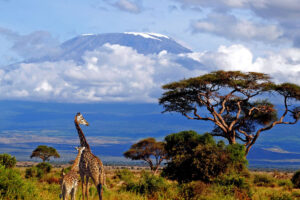
Johannesburg, South Africa
CNN
—
The US ambassador to South Africa on Thursday accused the South African government of delivering arms and ammunition to a sanctioned Russian cargo vessel late last year, local media said.
“Among the things we noted was the docking of the cargo ship in Simon’s Town naval base between the 6th to the 8th of December 2022, which we are confident uploaded weapons and ammunition onto that vessel in Simon’s Town as it made its way back to Russian,” Ambassador Reuben Brigety II told local media, including News24.com.
“We are confident that weapons were loaded onto that vessel, and I would bet my life on the accuracy on that assertion,” the ambassador also said in a video released by Newzroom Afrika, a local news channel that was also at the briefing.
“The arming of the Russians is extremely serious, and we do not consider this issue to be resolved, and we would like SA to [begin] practicing its non-alignment policy,” he said, according to both news outlets.
In response to the ambassador’s claims, South Africa has summoned Brigety to Pretoria. In a statement released on Twitter Friday, Clayson Monyela, the head of public diplomacy for the South African foreign ministry, said it would “demarche the USA Ambassador to South Africa following his remarks yesterday.”
Monyela said a detailed statement would be released following the meeting. South African Foreign Minister Naledi Pandor would also speak to her US counterpart, Secretary Antony Blinken, about the matter, he added.
The presence of the mysterious ‘Lady R’ cargo vessel caused significant speculation when it docked at the naval base in Simon’s Town near Cape Town in December last year. Cargo vessels routinely dock at Cape Town’s civilian harbor, not the naval base.
At the time, opposition member of parliament and shadow Defense Minister Kobus Marais said in a statement that goods were loaded off and onto the ship during the overnight hours and demanded answers from the government.
The US Treasury Office of Foreign Assets Control added the Lady R to its sanctions list in May last year for alleged weapons shipments, along with a host of other Russian-flagged cargo vessels.
The South African presidency called the explosive allegations “disappointing” and warned that the remarks “undermine the spirit of cooperation and partnership” between the US and South African government officials who had been discussing the matter.
President Cyril Ramaphosa’s office said in a statement late Thursday that no evidence had been provided to support these allegations and that the government planned to form an independent inquiry into the matter.
“In recent engagements between the South African delegation and US officials, the Lady R matter was discussed and there was agreement that an investigation will be allowed to run its course and that the US intelligence services will provide whatever evidence in their possession,” the statement read.
CNN asked presidential spokesman Vincent Magwenya why an inquiry was needed for events at South Africa’s own naval base.
“US intelligence services said they had evidence that they would only provide to us via a credible investigation or inquiry. We take the allegations seriously, and we want to have a credible independent voice to state the actual facts of the matter,” he said.
“Otherwise, we risk a back forth series of accusations and denials, which is not going to be helpful in the context of our bilateral relations.”
It is unusual for a US ambassador in South Africa to make such public accusations against the government.
The South African government has come under intense criticism for its stance on Russia’s invasion of Ukraine and has routinely abstained from votes condemning Russia at the United Nations General Assembly.
While South African leadership has repeatedly stated that they are neutral in the conflict and have frequently called for a negotiated settlement, their actions have come under increasing scrutiny from Western powers.
In February of this year, South Africa convened naval war games off its coast including both the Russian and Chinese military.
Later this year, South Africa will host the BRICS summit, a grouping of Brazil, Russia, India, China, and South Africa. Russian President Vladimir Putin was invited to that summit.
South African officials have flip-flopped in their public commitment to the Rome Statute – the treaty that compels signatory nations to arrest individuals indicted by the court – after Putin was indicted for alleged war crimes in March.
While South Africa’s ruling party African National Congress has an ideological history with Russia and the former Soviet Union, the European Union and the United States are far bigger trading partners.
Source: cnn.com












